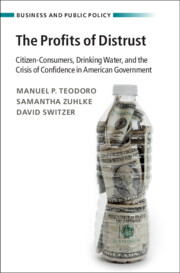 The Profits of Distrust
The Profits of Distrust Book contents
- The Profits of Distrust
- Business and Public Policy
- The Profits of Distrust
- Copyright page
- Dedication
- Epigraph
- Contents
- Figures
- Tables
- Preface
- Acknowledgments
- 1 Basic Services and Trust in Government
- 2 The Profits of Distrust
- 3 (Dis)trust at the Tap
- 4 Hyperopia and Performative Trust
- 5 Speaking Up or Opting Out
- 6 Geographies of Alienation
- 7 When Trust Pays
- 8 Basic Services and Rebuilding Legitimacy
- The Plan
- Book part
- References
- Index
- Other books in the series
7 - When Trust Pays
The Virtuous Cycle of Trust, Participation, and Service Quality
Published online by Cambridge University Press: 18 August 2022
- The Profits of Distrust
- Business and Public Policy
- The Profits of Distrust
- Copyright page
- Dedication
- Epigraph
- Contents
- Figures
- Tables
- Preface
- Acknowledgments
- 1 Basic Services and Trust in Government
- 2 The Profits of Distrust
- 3 (Dis)trust at the Tap
- 4 Hyperopia and Performative Trust
- 5 Speaking Up or Opting Out
- 6 Geographies of Alienation
- 7 When Trust Pays
- 8 Basic Services and Rebuilding Legitimacy
- The Plan
- Book part
- References
- Index
- Other books in the series
Summary
This chapter reverses the vicious cycle from previous chapters into a virtuous cycle of trust and government excellence. Excellent and responsive government agencies foster trusting citizen-consumers who use, advocate for, and support public services. Citizen-consumers who consume public services instead of exiting to commercial alternatives are more likely to support paying for further improvements to public services. Specifically, tap water drinkers are more likely than bottled water drinkers to support paying increased water rates to fund water infrastructure improvements. We then show how the citizen exercise of voice pushes public officials to provide higher-quality services. Although governments are not well suited to respond to citizen-consumer exit, they are designed to respond to the use of voice. Increased political participation raises the possibility of punishment for poor service delivery, incentivizing officials to keep service quality high. We find that increased electoral turnout is associated with decreases in water quality violations. Reframing the relationship between trust and public services as a virtuous cycle allows us to imagine a better way forward.
Keywords
- Type
- Chapter
- Information
- The Profits of DistrustCitizen-Consumers, Drinking Water, and the Crisis of Confidence in American Government, pp. 175 - 190Publisher: Cambridge University PressPrint publication year: 2022
